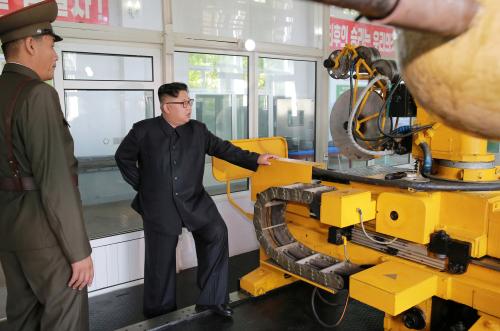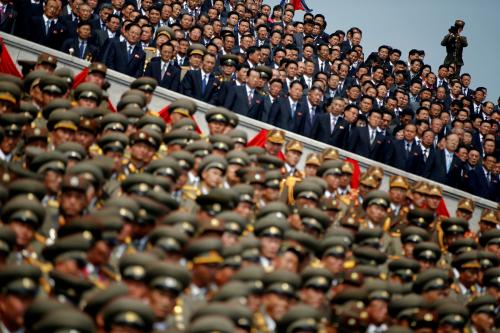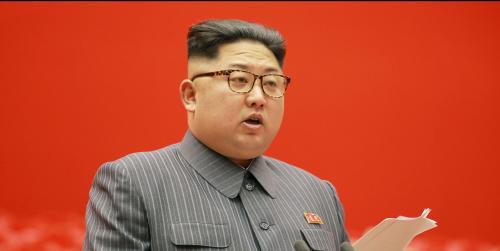The uncomfortable reality is that it is extremely unlikely North Korea will denuclearize on terms acceptable to the United States. As long as President Trump rules out a strategy of containment, the United States is stuck between the Scylla of appeasement and the Charybdis of war, writes Thomas Wright. This piece originally appeared in The Atlantic.
In August of last year, days before he was forced out of the White House, Steve Bannon gave an unusual interview to Robert Kuttner, a journalist at The American Prospect. The article made headlines because Bannon tore into his rivals, especially Gary Cohn, and in a progressive magazine no less.
But Kuttner’s piece also contained an astonishing detail about North Korea. He wrote that Bannon said he “might consider a deal in which China got North Korea to freeze its nuclear buildup with verifiable inspections and the United States removed its troops from the peninsula.” Given Bannon’s status as a hardline nationalist, some viewed his remark as a proxy for what President Trump might think.
Such a deal would be widely regarded as an unmitigated disaster for the United States. It would trade one of America’s most important alliances for a promise to freeze North Korea’s nuclear weapons program where it is—which is to say, it would legitimize its existing arsenal. It would signal that the United States cares little for its friends and is only concerned about direct threats to the homeland.
North Korea has offered such a deal before. It has held out the prospect of denuclearization in exchange for a peace treaty that included an end to the U.S.-South Korea alliance. The United States has always rejected such a deal. Many experts believe that one reason the North pursued ICBMs was to put pressure on the United States to “decouple” from South Korea.
After last night’s shocking news that Donald Trump has accepted Kim Jong Un’s reported invitation to negotiate one-on-one, the question is: What will Trump say if Kim offers him this deal or something even better—the dismantling of its ICBMs in exchange for the full withdrawal of U.S. troops from South Korea?
There are at least three reasons to believe he might be open to such a proposal.
The first is that Trump cares about the direct threat to the American homeland more than anything else. President Obama warned him of the North Korean ICBM threat immediately after the election and he has taken it to heart. He has pursued a unilateral policy and has held open the possibility of a preventive strike without prior approval from Seoul. This is the essence of “America First”—narrow U.S. interests supersede all other concerns. It is a significant conceptual break with traditional American policy since the late 1940s, where the United States treated threats to the homeland and to the allies equally.
The second is that Trump has always had concerns about alliances in general and the U.S.-South Korea one in particular. Since the mid 1980s, he has argued that America’s alliances are a bad deal. Initially his wrath was focused on Japan and the Arab states but in 2013, he said, “How long will we go on defending South Korea from North Korea without payment? … When will they start to pay us?” In an interview with NBC in 2015, he said, “We have 28,000 soldiers on the line in South Korea between the madman and them. We get practically nothing compared to the cost of this.” Perhaps Trump may think that an end to the ICBM program and the withdrawal of U.S. troops from South Korea is a win-win.
You gotta give him credit. How many young guys—he was like 26 or 25 when his father died—take over these tough generals, and all of a sudden … he goes in, he takes over, and he’s the boss. It’s incredible. He wiped out the uncle, he wiped out this one, that one. I mean this guy doesn’t play games. And we can’t play games with him.
As Victor Cha has written in The New York Times today, there are only two possible negotiating approaches—economic concessions in exchange for a freeze of the nuclear program, as U.S. presidents have done in the past, or going big with a peace treaty that could include the withdrawal of troops. Trump is unlikely to want to repeat the actions of his predecessors. The Bannon deal would allow him to say he eliminated the missile threat and has saved the United States billions of dollars in the process.
It’s possible that these fears are unfounded. Perhaps, Trump will sit down with Kim Jong Un and raise the curtain on a detailed negotiation conducted by diplomats in which North Korea takes concrete steps toward denuclearization of all of its arsenal, not just its ICBMs, without an end to the U.S.-South Korea alliance. But the truth is no one knows what he will do.
North Korea has been seeking a sit-down with American presidents for decades. Previous presidents refused because they believed other countries needed to be at the table too and they did not want to let Pyongyang portray North Korea as an equal to the United States.
The summit proposal and acceptance surely came as a shock to Trump’s Cabinet. They will no doubt be working furiously to ensure that the summit protects key U.S. interests, including the alliance with South Korea. Their task now is to prevent Trump from meeting with Kim one-on-one and to ensure the U.S. side follows an agreed-upon script with specific goals. But they have no ambassador to South Korea and the State Department’s Special Envoy Joseph Yun chose to retire last week. It’s hard to be optimistic that they can manage the president.
Then there is the risk if they follow the official script. What if Trump sticks to the talking points and North Korea refuses to denuclearize? Does that then provide the pretext for a preventive war? Such a conflict could result in hundreds of thousands of casualties, it would lead to the collapse of the U.S.–South Korea alliance, it would badly damage the U.S. position in East Asia, and it would pave the way for Chinese domination of the region.
The uncomfortable reality is that it is extremely unlikely North Korea will denuclearize on terms acceptable to the United States. Yes, it is worth testing that proposition on a diplomatic track but that has to be the base case. As long as President Trump rules out a strategy of containment, the United States is stuck between the Scylla of appeasement and the Charybdis of war.
The Brookings Institution is committed to quality, independence, and impact.
We are supported by a diverse array of funders. In line with our values and policies, each Brookings publication represents the sole views of its author(s).








Commentary
Op-edThe biggest danger of North Korea talks
March 9, 2018